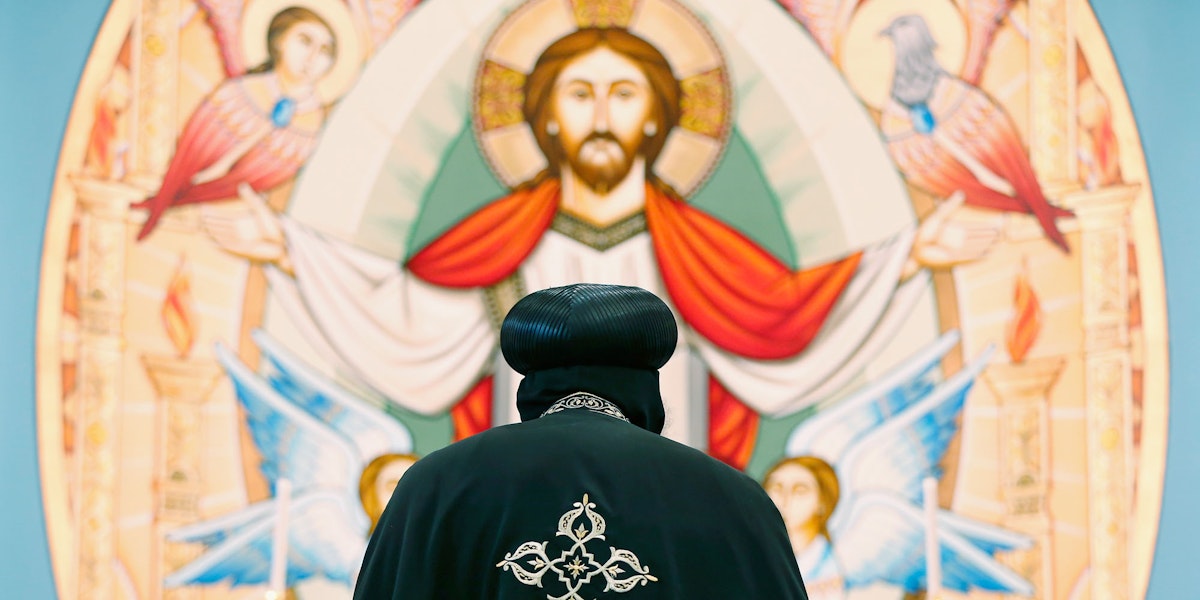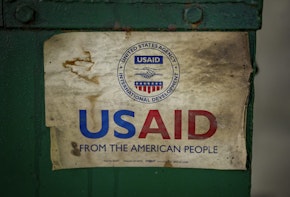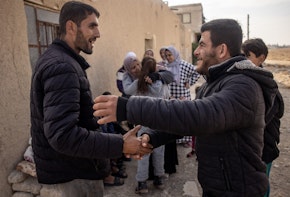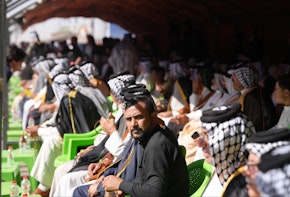Elizabeth Monier has researched the rich variety of non-Muslim communities across the Arab world, paying special attention to the dynamics affecting Yazidi and various Christian populations in Iraq and Egypt. There is no monolithic “Christian” community in the Arab world, she argues. Researchers and policymakers should pay close attention to the specific context and characteristics of varying communities. At the same time, efforts to improve conditions for people in the Middle East should begin with universal rights that apply to all. The framework of minority rights granted by a majority has driven some of the most problematic dynamics in the region. Monier spoke to Thanassis Cambanis over the telephone from Cambridge, United Kingdom, in February, 2019.
Thanassis Cambanis: You’ve said that Christians in the Middle East represent different denominational, ethnic, and linguistic identities. Is it unproductive to talk about Middle Eastern Christians as a homogenous group or to assume a united perspective on questions of national belonging and citizenship? How should we think and talk about Christians in the Middle East?
Elizabeth Monier: In my research on these kinds of questions I keep coming back to the importance of raising awareness of the diversity between and within different communities and to acknowledge this in the public sphere, as well as the opportunity that the idea of citizenship represents for integrating this diversity into the broader national consciousness. Starting from the point of religion is counterproductive for the purposes of this project, which is trying to move away from religion as an identity, rather than as a belief. By talking about a “Christian perspective,” we a priori assume that political, social, and cultural perspectives are based on religious identity. That already starts to undermine what we’re hoping to achieve in terms of inclusive citizenship. Instead, we need to start with the idea of citizenship and talk about citizens, and find a unity of purpose in that. When we’re talking about the problems that Christians are facing, we should also acknowledge that it’s not just Christians who are facing these issues. It’s really all citizens in a given state. It’s the lack of democracy and the lack of a culture of citizenship that affects everyone—regardless of religious identity. It’s acknowledging that diversity exists among religious denominations and that society is made up of different religious, ethnic, cultural, and linguistic identities. All citizens are facing these challenges, and therefore they need to be addressed as a universal problem, rather than as one exclusively faced by Christians or a particular religious denomination.
Starting from the point of religion is counterproductive for the purposes of this project, which is trying to move away from religion as an identity, rather than as a belief.
At the same time, this is not to say that all citizens are coming from the same starting point. Even among Christians, the issues cannot be assumed to be identical. There are inevitable differences between Christians of the same denomination across national borders, just as there are differences between different religious groups within one nation. This means there is no single solution to achieving inclusiveness. Solutions have to be formed within the varying national contexts.
Normalizing Difference
Cambanis: Descriptively, of course, in some of the contexts I’m familiar with, the conditions for Christians are different than other groups, such as a Muslim majority. When one thinks about Christians in the Arab World, how do we avoid the monolithic impression that there is one Christian community? Also, how do you also describe the particularities and differences experienced by Christians in terms of citizenship, rights, or social standing?
Monier: One step toward avoiding this idea of a monolithic Christian community is to move away from the overuse of the minority/majority language. When you read media and policy reports talking about what’s happening to Christians and the violence they’ve experienced in recent years, it’s always described as the “Christian minority” or the “Coptic minority.” The minority discourse is unproductive, and gives the impression of a single Christian community up against a monolithic Muslim majority. It oversimplifies the situation and obscures many of the real problems. We should talk about Christians, and the particular difficulties they endure, but also normalize them by not speaking about them exclusively as a “minority” or an “Other.” In the Western context, “minority” has positive normative connotations in that we’re trying to help vulnerable people by ensuring their rights. But in the Middle East, “minority” really has a powerful sense of Otherness, difference, and not belonging. I try to move away from that and instead focus on normalizing difference, which the Coptic, Chaldean, and Assyrian Churches sometimes do. They talk about the indigenous presence of these communities, which I think is quite positive. Funnily enough, in Iraq, they have been forced to do this because of the magnitude of the violence. They are publicly and visibly talking about the heritage of these communities and how they are central and integral to Iraqi identity.
You need to promote the ideas of equality, citizenship, democratization, and representative democracy. Second, you need to empower the specific contributions, culture, and denominational backgrounds of the communities and bring them into the public sphere.
There are two ways of normalizing difference. First, you need to universalize the call for inclusive citizenship (for example, the Chaldean patriarch Louis Sako talked about citizenship by emphasizing that he’s promoting this for all citizens, not just for Christians). You need to promote the ideas of equality, citizenship, democratization, and representative democracy. Second, you need to empower the specific contributions, culture, and denominational backgrounds of the communities and bring them into the public sphere. So you have to come at it from both ways. You want to acknowledge difference and bring it into the national, public arena so that it is part of the national and not the Other.
Communities in Decline
Cambanis: Let’s talk about the specific case of Iraq. What has become of the presence of Yazidis and other religious communities—not just Christians? Are some of these communities disappearing from the map in Iraq?
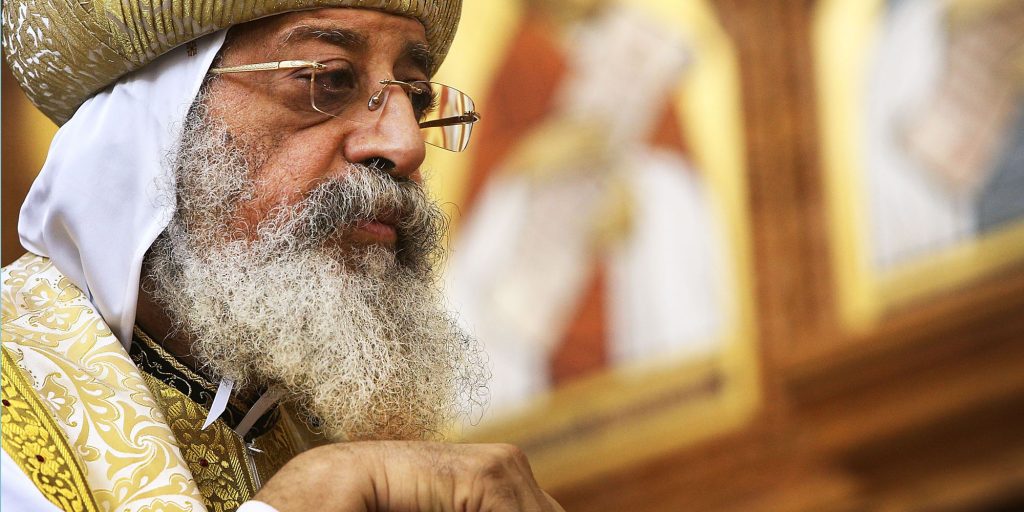
Monier: Yes. The decline of non-Muslims in the Middle East is not recent. It has been going on for decades. Many of these communities are also conscious of a long history of persecution and displacement, perhaps particularly those in Iraq. The most recent violence occurs in this context. In terms of Iraq, the recent decline has been dramatic. The U.S. invasion of Iraq, the ensuing sectarian violence, and the emergence of the Islamic State has just accelerated this trend. In 2003, the Christian population was estimated to be between 1.5 and 1.8 million. Now it is at between 250,000 and 300,000. The Iraqi Christian diaspora is far larger than the population of Iraqi Christians living in Iraq. This has consequences and implications for how the Iraqi Christian community deals with its identity and its place in Iraqi society. I think one of the reasons religious leaders have taken on a stronger and more visible political role has been this decline, and leaders’ need to stem it. All the leaders understand why people are leaving, but it’s part of their policy not to encourage it, because they feel it’s important to remain within the homeland. Their heritage is very central to the way they understand their contemporary religious, political, and social identity, as well as their culture and language.
Yazidis see the recent displacement as an existential threat. Even if they are able to find refuge outside Iraq, there is a real fear that Yazidi heritage will be so fragmented that it will disappear. To counteract that, there has been a massive increase in the number of Yazidi nongovernmental and media organizations that seek to preserve the community by raising awareness and reconnecting the diaspora.
Cambanis: That leads to a strange dynamic where you have community leaders who are encouraging individual people to stay in situations that makes no sense for them. I’ve certainly seen this in Iraq and in Syria during the war. Church officials want to preserve a geographical community, but the people themselves are in grave danger if they stay in those places.
Monier: It’s a beyond-difficult situation. I think there is a clear understanding that people need to leave and be protected. Across the board, leaders are looking at security, working with governments, and partnering with foreign organizations to secure people.
Legal Rights and Cultural Gaps
Cambanis: When we look at Iraq, it seems that it has a more solid and promising basis for inclusive citizenship than some of the other Arab countries that really do create de facto and de jure second-class citizenship for non-Muslim communities. It’s striking then that Iraq, both before and after the 2003 invasion, has actually witnessed the most precipitous decline of pluralism. That includes the plight of Christians but also the genocide of Yazidis. How do you make sense of that? What drove that reversal of pluralism? What role—perhaps positive or negative—has state policy played in creating different positibilites?
Monier: Iraq, like many countries, has equality in legal terms—equal citizenship and rights accorded to non-Muslims. Many people are promoting human rights and minority rights. But the problem is not only about the legal clauses. I think we have to acknowledge that there is prejudice that is endemic throughout society. This prejudice leads to everyday discrimination. It’s in your relationship at work, in school, in bureaucratic settings. So regardless of what the law says, it is not being properly implemented. The people who are implementing the law are acting within a state that has normalized discrimination. Pluralism is acknowledged but it isn’t really accepted. So, the reality on the ground in terms of the lived experience of rights and inclusion is very different.
The problem is not only about the legal clauses. I think we have to acknowledge that there is prejudice that is endemic throughout society. This prejudice leads to everyday discrimination. It’s in your relationship at work, in school, in bureaucratic settings.
Iraq’s 1925 constitution acknowledged the necessity of ensuring that non-Muslim minorities have political representation. But securing this representation is still a concern among Christians today, as seen in the May 2018 elections, when there was some criticism of the way that the Christian quota was elected. Perhaps this acknowledgement of difference without its acceptance is the most dangerous mixture, because it gives greater sway to identity politics without a strong enough central government or an inclusive national identity to counterbalance those who would exploit identity for political gain. Some Christians even look back approvingly on the stability under Saddam Hussein, when the Arab identity was highlighted. Some Christians could assimilate to this idea—most commonly, the Chaldeans, which is why they have tended to be quieter politically.
The Assyrians, on the other hand, have found such assimilation much more difficult, because of the central place of the history of displacements in their communal politics and their preference for an autonomous region. They have feared for the erasure of their non-Arab identity. Clearly, the Arab identity was not inclusive and required assimilation through dropping elements of diverse identities. Therefore, it was not durable.
During the drafting of the 2005 constitution, Christians were strongly involved in the debates on how to describe Iraq’s diversity. As a result, Christians, Yazidis, and so on were not described as minorities but as components—“makowwanat”—of the Iraqi nation. The different communities, including different Christian denominations, were all named for the first time. This was progress. But then came the rise of sectarian violence and the emergence of the Islamic State. This again underscores the fact that there has not been a normalization or full acceptance of diverse identities within society.
Tolerance is the one notion that’s been talked about quite a lot, but I have reservations about this. Tolerance can be quite different from acceptance.
Again, legal clauses and political rhetoric are not enough to address a problem that is society-wide and needs to be addressed as such. Tolerance is the one notion that’s been talked about quite a lot, but I have reservations about this. Tolerance can be quite different from acceptance. We have tolerance when it’s convenient, but it’s not really a deep enough concept to lead to a culture of acceptance that would reduce the effects of political destabilization. If we understand, which I think we have to, that what is meant by inclusive citizenship is a universally held sense of equal belonging in the nation, not just equal rights on paper, then this requires a “beyond tolerance” approach that focuses on acceptance and internalization of the value of plural identities to the nation.
The Authoritarian Bargain
Cambanis: The most practical solution to this is the authoritarian bargain that we find in Syria or Egypt, where Christians who fear discrimination or prejudice turn to an authoritarian protector to give them some of the rights that they are not getting, socially or politically.
Monier: This is another dilemma. Many people don’t understand Coptic support for Egyptian president Abdel Fattah el-Sisi, but it’s easy to understand when you look at examples like Iraq. In that case, many would prefer an authoritarian bargain, with rulers who offer security and limited inclusion, to the current situation. Under Hosni Mubarak (Egypt’s president from 1981 to 2011) the government always presented the choice as being between Mubarak or Islamists and terrorists. Naturally, many went with Mubarak—which I guess is understandable, but not ideal. In Egypt, this authoritarian bargain has not removed discrimination and violence—we’re seeing attacks on churches and Christians all the time. So no, the authoritarian bargain is an insufficient solution while we try to think of what to do. I heard an interview with Bishop Anba Angaelos—the Coptic Orthodox bishop of London—in which he basically said, “We just don’t know what else to do.” Which is unfortunate.
In Egypt, we haven’t really moved forward since the 1920s, past this kind of national unity discourse that promoted Christian rights to a certain point, but couldn’t go beyond that. Now that discourse has actually become a barrier to widening debate. The national unity discourse has made it difficult to discuss Coptic rights. Any questioning of the problems between Muslims and Christians is portrayed as a betrayal of this national unity ideal, which stems from the 1919 revolution. This is why I feel a bit more optimistic about Iraq in comparison to Egypt—there is more space at the moment to discuss, address, and find new solutions. Whether it will happen, I don’t know. I have to remain hopeful, however.
Cambanis: It’s bizarre that Egypt, which has a much larger portion of Christians and more demographic diversity, has fewer possibilities for some kind of equality or nonreligious basis for rights. I would have expected it to be the opposite.
Monier: I think there are several reasons for this. Firstly, this national unity discourse is so entrenched on both sides in Egypt—Muslims and Christians being two parts of the social fabric. So any acknowledgement of a problem is seen as a betrayal of the nation and therefore becomes associated with foreign actors trying to undermine Egyptian stability. Another reason is that it’s always a risk to step outside of this entrenched relationship between the church and the state, and how the two institutions manage the affairs of Christians. The church has a lot of influence in this role, so to change the relationship between the patriarch and the president risks reducing the influence and the role of the church in Coptic political life. So it’s not just resistance on the side of the state or of the Muslim majority. There’s also resistance on the side of the church, which is used to this relationship where it has authority over the affairs of Copts.
Any acknowledgement of a problem is seen as a betrayal of the nation and therefore becomes associated with foreign actors trying to undermine Egyptian stability.
Cambanis: Why is it that the church is the political leader of these Christian communities in an era when most other people, regardless of their religious community, have a political leadership that is separate from their faith leadership?
Monier: We had an opening up of the political scene in Egypt after independence going into the 1920s and 1930s, where the representatives of the Coptic community were the Coptic elite—the landowners who were taking part in politics, lawyers, and other very visible public figures in the media. But the changing political climate after the 1930s reduced lay Coptic involvement in political life. The rise of the Muslim Brotherhood was one reason. The collapse of the Wafd Party was another. Then there was the Free Officers revolution of 1952.1 Also, changes in the church structure took place in the 1940s and 1950s, when the church was having a revival, partly in response to foreign missionaries who were increasing their levels of education and organization. In response to the shutdown of political parties under Gamal Abdel Nasser, and the nationalization of the media, avenues for political participation were shut down. The church became this separate place where Copts could express themselves. At this time, the patriarch took on a representative role, which was only enhanced under Pope Shenouda III, who was quite a political figure.2 He very much centralized the church around his authority, strengthened his role, and took on a “millet” leadership role very seriously.3 All of that really grew under Mubarak.
Reactionary Church Leadership
Cambanis: During the uprisings of 2011, the Christian religious leaders were incredibly reactionary. On the one hand, they had legitimate ongoing concerns about violent persecution of Christians by Muslim Egyptians. On the other hand, the calls for a civil state based on legal equality for all were roundly rejected by the church leadership. The church seems to be one major locus of reactionary, authoritarian political thinking. It’s sort of a bedrock part of the problem where rights are located in identity and religion rather than in some other more malleable or open place.
Monier: Absolutely, that’s exactly the problem. It’s not just from the side of the state, it’s also from the church authority very much wanting to maintain this role and their authority over personal status law, for example. That’s quite a symbolic area of religious authority, upheld strongly by the church. The Coptic Church was against the revolution, and told Copts not to protest, and so on—it tried to preserve its relationship with Mubarak and the status that it had gotten accustomed to, as a national church and political force.
Cambanis: Do Christians in Egypt have a better choice or are they in such a weak position that it’s unlikely that they would feel safe moving away from this kind of church supremacy within their community and this authoritarian bargain outside their community?
Monier: I think the majority still doesn’t want to move away from this arrangement. They are happy to be under the authority of the church. Unfortunately, despite Egypt’s long history of legal rights, it’s the culture that promotes religion as the main locus of social life. It’s almost unthinkable how one could move away from that. But there is a growing section of the Coptic community that has moved away from these cultural restrictions. There is more scope for criticizing the strategy that the church is adopting, and the authoritarian bargain. You saw it in that early transition phase—there was open criticism of the church, which wouldn’t have happened before, criticism of the church was seen as a betrayal of one’s community. But this criticism was quickly shut down, in the same way that criticism from the general society was quickly shut down. The threat of the Muslim Brotherhood and the government of Mohamed Morsi really forced the Copts back into this bargain. The experience of that and the fear of it continuing pushed them to support Sisi. Not all Copts still support Sisi—and I think the proportion is shrinking all the time. But many Copts are still very much behind Sisi.
Cambanis: Has the calculus changed for Christians and other similar communities in Egypt following the rise of the particular brand of Islamism that we saw come after 2011?
Monier: Yes, I think so. The rise of the Islamists in Egypt confirmed the Mubarak-era discourse that if you got rid of Mubarak, you were left with Islamists. Christians were afraid—that’s the impression I got from what people were saying. In fact, many were seeking to leave.
Islamism and Rights-Based Citizenship
Cambanis: Is mainline Islamism today compatible with a rights-based polity?
Monier: There are so many different varieties and interpretations that it’s difficult to say. If you want an Islamist state, then non-Muslims or nonpracticing Muslims can never have full belonging, even if they have equal rights. I think that much of the debate is not only between Muslims and non-Muslims, but also between those who want a religious basis for the state and those who don’t. That debate is going on within the Muslim community as well. If you look at some of the debates about democracy and transition and citizenship that are ongoing in Egypt and Iraq, it’s not so much between religions but actually between viewpoints, between those who want a secular state and those who want a religious basis for the state. In Iraq, even with the acknowledgement in the 2005 constitution of all the different communities, you still have the privilege given to the Islamic identity of the Iraqi state. An article designating Islam as the state religion exists in almost every constitution in the Middle East, and was also retained in Egypt’s new constitution.
I think that much of the debate is not only between Muslims and non-Muslims, but also between those who want a religious basis for the state and those who don’t.
Interpretations matter too, however. Tunisia’s most recent constitution retains the nod to Islam as the religion of the state, but the openness of the debate on this article was notable and it has not restrained Tunisia’s ability to introduce reforms that are out of line with Islamic sharia, such as overturning a law that prohibited a Muslim woman from marrying a non-Muslim man. So, again, the barriers to developing an equal and inclusive citizenship culture are not only related to how the belonging of non-Muslims is perceived in a state that accords a privileged place to Islamic identity. More broadly, the barriers relate to the role religion should play in interpreting the social, political, and legal character of the state, and its dealings with its citizens.
Cambanis: What about the model in Syria, and to a lesser extent Iraq, that comes from Shia-dominated areas and parties that have tried to position themselves as defenders of pluralism and have argued that they effectively have a different model of communal governance than their Sunni-dominated predecessors, who pretended to be secular? In their practice, they argue, there is genuine and legitimate room for religious minorities to have full political participation. Is that really a different model? Should we understand this as a real development of a model that acknowledges the legitimate right and historical presence of other non-Muslim or non-majority communities?
Monier: I suppose it’s a model, but I don’t think it can provide full inclusiveness in the way that we perhaps understand it from Western scholarship. You acknowledge the difference, but I imagine there is still a sense of hierarchy. If there is still a hierarchy set up by the idea of majorities and minorities, you never fully de-securitize difference, because there is an order to be maintained—a set of power relations. There is still going to be a pecking order. Minorities will still be vulnerable in times of economic difficulty and instability. It can perhaps give some form of representation but it still reifies religious identity as something that is fixed, or something which should shape political relations. It’s an alternative, but it’s not one I would term “inclusive.”
The Need for a Plural Heritage
Cambanis: It’s certainly better to be a secular person or a non-Muslim in Bashar al-Assad’s Syria than it is in an area under Islamic State or al-Qaeda control. But neither regime is actually good. One of the things that is so frustrating is that when the political debate is framed in majoritarian terms, and there are red lines around the “Arabness” or the “Islam” of the state, you almost have no standing in the debate if you are a secular Muslim or a Christian or even a pious person who believes in secular rule. It is the pious Muslim-majority polity’s right to decide and dispense. How do you argue for reopening the debate to all citizens and giving all citizens equal standing in designing the nations they live in?
Monier: I absolutely agree and that’s my standpoint—not to start from this division into majorities and minorities. Inevitably that sets up power relations that are unequal. The minority will always come from a weaker and unequal standpoint in terms of the political power structure and relations. As for changing that, I find it problematic given states’ identities. Going back to the Egyptian and Iraqi nationalisms of the early twentieth century, which obviously had a strong strand of religion and ethnicity, they were much more territorially and nationally focused. In Egypt, they highlighted the pharaonic way of linking different religious communities together. In Iraq, you have the potential of that. I’ve heard a little bit among civil society groups about promoting museums that look at the heritage of Mesopotamia as a shared heritage. Often, the Christians like to take this on as their own heritage, but it’s about opening up as a platform for shared dialogue about Iraqi heritage as a whole. I can’t see any other way than the idea of a plural heritage in which all the different strands are acknowledged without giving them unequal weight. Perhaps I’m being naive, but I think you have to go back to schools and civil society, because it takes time to instill a positive attitude towards pluralism.
I can’t see any other way than the idea of a plural heritage in which all the different strands are acknowledged without giving them unequal weight.
In terms of heritage, we shouldn’t just focus on the idea of Arab heritage as the glorious heritage of the population. This is what happened in the Arabism movement of the late nineteenth century. Figures like Jurji Zaydan (1861–1914) wrote about Islamic history and Arab and Muslim figures as shared historical heroes across the community. This approach came mainly from those Christians who were promoting the Arab Christian identity idea as a way of bridging the gaps between communities. This worked for some Christians, but not all, because for some it required too much assimilation at the expense of other aspects of their identites. Reopening the debate requires improving public knowledge of diversity and breaking down taboos, and this requires a genuine political will and comprehensive approach that employs education and media as well as political and legal channels. In schools, you could celebrate Coptic heritage—a period that is often overlooked—instead of studying ancient Egypt and skipping to Islamic Egypt. I think that’s changing slightly, but it is crucial to bring these things into schools and the media, and to publicize and celebrate all aspects of the heritage, in ways that go beyond ethnic and linguistic divides.
Cambanis: And some of these communities really do suffer from a dual exclusion—whether on a religious or ethnic basis—in an era where there’s this majoritarian supremacist view of the region being Arab-Islamic. Any group that doesn’t fit in on either axis is not just excluded but is often given secondary legal status.
Monier: Absolutely, and you see that in scholarship, where most people study the Middle East through the lens of Islamism or Arabism—they’re the two most common ways that people think about and study the region. They are forgetting all this diversity. I think that has been changing in recent years, however, which is really positive.
Cambanis: Has the genocide of Yazidis changed people’s understanding of these questions by showing the danger of literal erasure in the region? I feel the West instrumentalizes the plight of minority groups for its own purposes, but what about people in the region?
Monier: Yes, all the violence that’s happening has pushed governments to actually rethink the impact of these structures that have been in place for so long. The response to the Yazidi genocide has been interesting—it has given scope to talk about these problems a bit more. But I think it’s still kind of discussed asseparate from internal issues. For example, we talk about the Islamic State as terrorists and foreigners, which is what happened a lot in Egypt when you talked about sectarian violence. It was always about how they’re foreigners and terrorists, and it was never about acknowledging that it comes from within our society. We need to address this internally, as well.
It’s also about acknowledging the diversity in the region. I think a lot of Christians in Egypt, as well as Muslims, had never even heard of Yazidis before. In a sense, the violence highlighted that there is a greater diversity than is usually acknowledged, and that debates should be wider than the Muslim–Christian dynamic. In the future, we’ll see whether that will have any more impact, but for now I think the impact was short-lived.
A Feeble Secularism
Cambanis: What, if any, is the existing discourse on secularism or universal rights that you began this conversation with? Who, if any, are the people who are organically raising these possibilities—whether from within Christian communities or other communities?
Monier: It’s a minority. “Secularism” is still a problematic term in the region. Because of the support of the church’s position and the church holding onto this role in Egypt, there is a difficulty in the idea of becoming fully secular. Religious identity is strong, and having the church leader as a representative feels protective. It’s difficult to come out from that.
The Arab uprisings did show that there is a growing sense that secularism is the solution—but I don’t think it’s just a Christian issue. The debates are more between those who argue for the religious debates and those who want more secular debates. For example, I think Ismail Nasr al-Deen (an Egyptian member of parliament) proposed a bill to remove religion from identification cards in Egypt, so it’s not just a Christian initiative that is trying to open up that debate.4
Cambanis: Just a few generations ago, Christians were among the leading intellectuals in creating movements that were nonreligious in their basis. Some of these movements were unfortunate in their own way, like the Ba’ath. Others included the Communist Party or the Wafd. But the impulse was to strengthen a political space where Christians—as Egyptian citizens—could have equal standing with their counterparts. Today, there doesn’t seem to be such a dynamic—even in an intellectual space.
Monier: I think it may exist more in civil society, which we don’t see because civil society is quite weak and still quite pressed within the political system, particularly in Egypt. I think that’s where the people who have these impulses to try and promote secular culture are really finding their space, more than in public or political circles.
Tolerance Is Not Enough
Cambanis: In the most recent years, what have you been focusing your research on?
Monier: I’ve been following the pope’s visit to the Gulf, which is quite interesting in terms of “tolerance” being promoted. I mentioned I’m not massively keen on the idea of tolerance—I don’t think it goes far enough. But I also feel optimistic about this dialogue, and I’m wondering how far it can permeate the region beyond this enclave. It’s an interesting approach, and it is trying to combat Islamic extremism by promoting a different culture. It will take time, but if that kind of approach starts to spread a little bit more, that could be the beginning of something positive. I’m also focusing on the Chaldeans and their use of citizenship. I’m focusing on Louis Raphaël I Sako, the head of the Chaldean Catholic Church, and how he is understanding citizenship and minority identity5. I’m still in the process of working out my ideas and gathering the data. I’m in the thick of these ideas about minorities, majorities, and problematizing this construction and looking for alternatives.
Cambanis: How do you preserve particularity—individual desires to express some identity or culture—under a regime of universalist rights?
The kind of universal citizenship rights regime that is needed is not one that erases difference. It is actually about bringing particular identities back into the national identity, so that national identity does not celebrate and protect only the numerical majority.
Monier: The kind of universal citizenship rights regime that is needed is not one that erases difference, like perhaps Arab nationalism tried to do by forcing an Arab identity upon citizens at the expense of other aspects of identity, as a way to forge unity. It is actually about bringing particular identities back into the national identity, so that national identity does not celebrate and protect only the identity, culture, language, or religion of the numerical majority. The progress of the Amazigh in North Africa in recent years has been interesting in this regard, in seeking a renewed acceptance of the Amazigh roots of the Maghreb region, such as through making Tamazight not only a language spoken by a minority but also an official language of the state, which happened in Algeria in 2016.6 The aim is not assimilation of the particular but to publicly incorporate and normalize difference into the destiny of the nation.
This transcript has been edited for clarity.
This interview is part of Citizenship and Its Discontents: The Struggle for Rights, Pluralism, and Inclusion in the Middle East, a TCF project supported by the Henry Luce Foundation.
Cover Photo: Coptic Pope Tawadros II recites a prayer in the new Cpotic church inside Eporo Tower in Melbourne, Australia. Source: Darrian Traynor/Getty Images
Notes
- The revolution of 1952, led by the Free Officers Movement, resulted in the end of the monarchy and the rise of Gamal Abdel Nasser, who became president in 1956.
- Shenouda (1923–2012) was patriarch from 1971 until his death.
- The term “millet” comes from Ottoman law, and refers to a system in which confessional communities are governed in their personal lives by the laws of their respective religious institutions.
- See “Bill to Omit Mention of Religion on National Id Card: MP,” Egypt Independent, November 11, 2018, https://ww.egyptindependent.com/bill-to-omit-mention-of-religion-on-national-id-card-mp/.
- Louis Raphael Sako, “Cardinal Sako: Iraqi Christians, caught between survival and migration,” AsiaNews, August 24, 2018, http://www.asianews.it/news-en/Card-Sako:-Iraqi-Christians,-caught-between-survival-and-migration-44743.html
- Jillian Kestler-D’Amours, “Algeria’s Berbers protest for Tamazight language rights,” Al Jazeera, December 15, 2017, https://www.aljazeera.com/news/2017/12/algeria-berbers-protest-tamazight-language-rights-171213185709684.html
